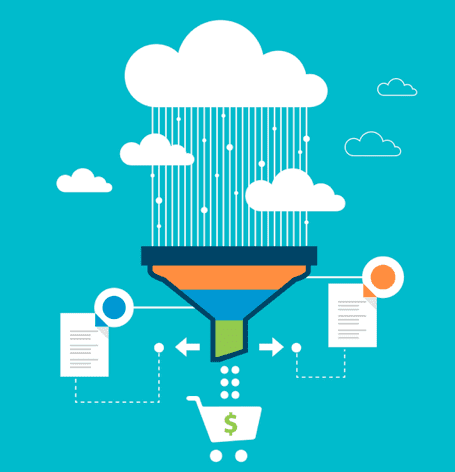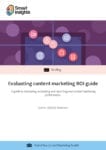How to boost the effectiveness of your content marketing with properly mapped buyer personas
If you want to maximise results from your content marketing strategy, it is essential to map your buyer personas to the buying cycle. This is executed by delivering the right content, to the right people, at the right time.
If your business is B2B, your content marketing strategy is crucial to your success because 64 percent of B2B customers will engage in upwards of five blogs prior to purchase. However, a mere five percent of marketers believe their content marketing strategy is moving in the right direction, according to Top Rank Marketing.
Blogs, videos, ebooks, case studies, and infographics are all invaluable content marketing assets. And you want these content marketing assets represented in each stage of the buying cycle.
To make the absolute most of your content marketing strategy, you need to develop your buyer’s journey. This allows you to encompass purchase points for your buyer personas, ending with familiarity on both sides of the fence, simply driving sales.
Let’s take a closer look at how mapping buyer personas to the buying cycle can maximize your content marketing strategy.
What is a Buying Cycle and How Can You Use it With Your Content Marketing Strategy?
A buying cycle is essentially the journey you want your potential buyers to take. You want to take them from being completely unaware of your company’s mission, products, and services, to seeing you as a company they can count on for solutions.
The buying cycle consists of three key elements with a top down funnel approach. These elements are the Top of the Funnel (TOFU), Middle of the Funnel (MOFU), and Bottom of the Funnel (BOFU). This is why a buying cycle is often referred to as a buying funnel.
A buying cycle is comprised of five customer stages, including awareness, interest, evaluation, commitment, and sale. These customer stages are important, because they are where you want to utilize the right assets of your content marketing strategy.
Download Expert Member resource – Evaluating Content Marketing ROI Guide
This guide is aimed at helping you improve your confidence in the value of content marketing by stepping you through a range of techniques to help marketers evaluate and prove their content effectiveness. These techniques will help you to prove to your colleagues or clients which content types and distribution techniques are most effective.
Access the Evaluating content marketing ROI guide
Smart Insights Expert members can also download a persona template for mapping TOFU, MOFU and BOFU content to each persona from our researching personas guide.
Research by Ogilvy, Google and TNS found valuable brand connection attributes you can employ when mapping your buying personas to the buying cycle.
- 73 percent chose a brand that offered useful information.
- 70 percent chose a brand that engaged customer passions and interests.
- 64 percent chose a brand that demonstrated its principles during evaluation.
- 63 percent chose a brand that shared news, updates, and special offers.
All of these considerations need to be present as you map your personas to your brand’s buying stages.
What Type of Content Should You Create?
Noble Crawford, tech entrepreneur and CEO of Video Social Creative suggests,
“Depending on which stage of the buying cycle prospects are in, salespeople are wise to have three specific content assets readily available.”
Crawford identified blogs, videos and case studies as powerful content marketing assets. Below are a few more content marketing assets ranked by effectiveness.
- Social Media Content (93 percent)
- Case Studies (82 percent)
- Blogs (81 percent)
- E-Newsletters (81 percent)
- In-Person Events (81 percent)
- Articles on Your Website (79 percent)
- Videos (79 percent)
- Illustrations / Photos (76 percent)
- White Papers (71 percent)
- Infographics (67 percent)
Content Marketing Strategy for the “Top of the Funnel” (TOFU) of Your Buying Cycle
The TOFU is where your buying cycle begins. And understanding the content marketing assets you need to employ at this step is vital.
Potential buyers who have stumbled upon your website and content are generally unaware they need you. It is also possible they have an issue, but they are far from thinking about a solution.
At this step of the buying cycle, you are simply raising awareness. You want to have the right content to engage and connect with your potential customer.
However, you want to stay away from any sales focused pitches. Offer value first, allowing potential buyers to gain insight about their issue, and seek the solution you are about to propose.

Blogs, expert content, videos, and infographics are assets you want to use at this stage in your content marketing strategy buying cycle:
- Blogs are certainly the most common content regarding TOFU. They should be informative and offer a connection between potential buyers and your solutions. Simply focus on giving massive value to your readers.
- Expert Content. Expert content, or pillar content, is detailed and used as a powerful education tool to raise awareness and fix pain points for your buyers.
- Using videos as part of your content marketing strategy is a powerful way to create awareness. Video in emails can lead to a 200 to 300 percent CTR increase, according to Small Business Trends. And 92 percent of mobile video viewers will share videos.
- Infographics are almost as powerful as videos when it comes to your buying cycle and content marketing strategy. Research on colorful visuals by Xerox found that people are 80 percent more engaged in reading content if it is presented using visuals. But don’t get to caught up on graphics. You want your infographics to include plenty of useful data too.
At the awareness stage, you want to focus on helping to identify the pain points of your buyer personas and offering them solutions to solve these pain points.
Content Marketing Strategy for the “Middle of the Funnel” (MOFU) of Your Buying Cycle
The MOFU of your buying cycle is a very important moment. It is when your potential buyers have become aware of an issue and are actively seeking a solution. It so happens that you have the solution, but your potential buyer has yet to realize it.
During this step of the buying cycle, potential buyers are gathering information about the solutions they now realize they need. And your goal is to ensure they understand what they need, and how your company’s products and services meet that necessity.
This is when you begin to nurture and educate. Utilizing assets in your content marketing strategy that educate your potential buyers is best practice. You want them to visualize your solution without the pushy sales routine.
Ebooks, white papers, and webinars are all exceptional content marketing aspects you can employ during this step in your buying cycle.
- Offering in-depth content in ebooks not only creates value by informing your audience, it also allows you to build your email list and increase ROI efforts, according to Forbes.
- White papers. Relatively similar to ebooks, white papers a should be focused, concise, and more in-depth. Think academic peer-reviewed articles with lots of data point and possibly sharing groundbreaking research that others in the industry haven’t shared.

At this stage, your buyers understand they have a problem and know that your company offers a solution. They are exploring potential ways of solving their problems and companies who offer the products or services they need. Showing them though leadership can help create brand affinity and create an opportunity for them to connect with you and choose to buy from your brand, over others.
Content Marketing Strategy for the “Bottom of the Funnel” (BOFU) of Your Buying Cycle
Once potential buyers have reached this step in your buying cycle, it's time to get more sales minded. You have now successfully mapped your buyer personas to the content marketing assets that drive commitment and sales.
The BOFU is where your potential buyers have read, watched, and researched your solution. They are not ready to choose you just yet, but you are in the running. Potential buyers commonly compare you to your competitors at this step in the buying cycle.
Employing demo videos, comparisons, case studies, and influencer resources are all powerful assets to employ during this very important moment. Free trials and product specs can also be useful asset at this stage as well.
- Expert Content. Interview experts and industry influencers and get them to endorse your company. Using influencers is nvaluable during a potential buyer’s evaluation process. A report by Google found that 74 percent of people made purchases based on a key influencer’s recommendation.
- Demo videos. Demo videos make potential buyers into buyers and followers. They are essentially tours of how your solution is the best fit. Demo videos can be live or recorded and uploaded. You can use this content marketing asset to showcase your products and services in real time, making the bottom of your buying cycle sales driven.
- Product Comparisons. Comparisons are another useful BOFU asset to drive sales at the bottom of your buying cycle. Many potential buyers are on the fence, comparing your solutions to your competitors. A comparison based on how you stack up against competitors is best practice in saturated industries.
Maximize Your Content Marketing Strategy with Powerful Buying Cycle Assets
Mapping your buyer personas to the buying cycle of your content marketing strategy is vital to boosting your brand awareness and converting potential buyers into purchasers.
The benefits of a well-developed content marketing strategy is a two-way street as well. Your customers get the solutions they need, and you get to maximise your marketing efforts.
Mapping your content strategy to your customer's buying cycle lets you use the right content assets, for the right people, at the most opportune moments. This most certainly increases those coveted conversions, allowing your business to grow exponentially and your investment in content to be maximised.
 Thanks to Nick Rojas for sharing his advice and opinions in this post. Nick Rojas is a business consultant and writer who lives in Los Angeles and Chicago. He has consulted small and medium-sized enterprises for over twenty years. You can follow him on Twitter: @NickARojas
Thanks to Nick Rojas for sharing his advice and opinions in this post. Nick Rojas is a business consultant and writer who lives in Los Angeles and Chicago. He has consulted small and medium-sized enterprises for over twenty years. You can follow him on Twitter: @NickARojas







 Thanks to Nick Rojas for sharing his advice and opinions in this post. Nick Rojas is a business consultant and writer who lives in Los Angeles and Chicago. He has consulted small and medium-sized enterprises for over twenty years. You can follow him on Twitter:
Thanks to Nick Rojas for sharing his advice and opinions in this post. Nick Rojas is a business consultant and writer who lives in Los Angeles and Chicago. He has consulted small and medium-sized enterprises for over twenty years. You can follow him on Twitter: 


